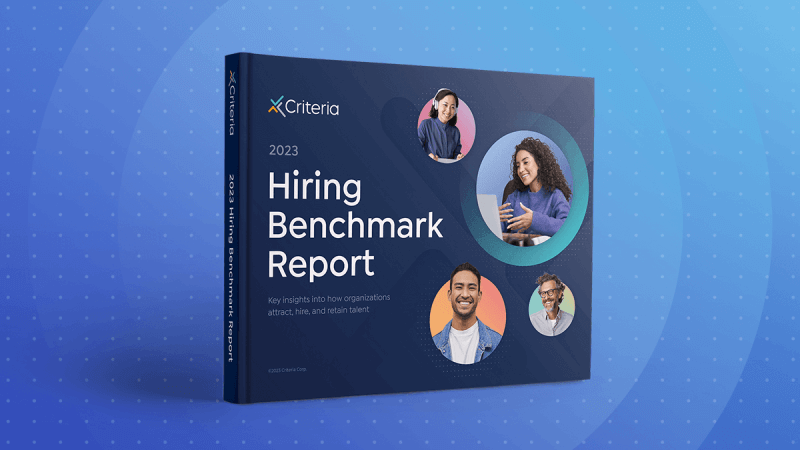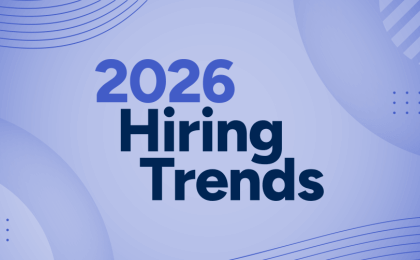Every year, we survey hiring professionals to learn about how they attract, hire, and retain talent – and how those trends evolve over time. The results of that survey are then compiled into our annual Hiring Benchmark Report.
The 6th annual report focuses on the unique hiring challenges of 2023. How are organizations adapting to an uncertain economic climate, high interest rates, a return to office, and the rise of AI?
Below, we’ve collected six of the most interesting findings from the report:
1. Hiring professionals agree we are facing a talent shortage
In today's competitive job market, 70% of hiring professionals admit to struggling when it comes to finding candidates with the right skills.
Meanwhile, a staggering 73% of hiring professionals believe that we are currently facing a talent shortage. These results highlight a growing concern with the talent market that the skills that employers need aren’t matching the skills that candidates currently have. This doesn’t mean there aren’t enough applicants, but that there aren’t enough applicants that employers consider qualified.
This talent gap isn’t likely to disappear any time soon, so how are organizations planning to close that gap? The data throughout the report provide some hints. For example, some organizations may seek to upskill their existing employees, while others may reevaluate their job requirements and take a potential-based approach to hiring. Others may seek to build out their training programs, while others may choose to turn to AI to accomplish key tasks.
2. The healthcare and manufacturing industries face major challenges
The survey results showed that some industries are particularly affected by talent shortages and high turnover rates. In particular, the Healthcare and Manufacturing sectors are facing the most significant challenges in terms of recruitment. Hiring professionals in these industries are more likely to struggle with both high turnover and talent shortages.
While 45% of the survey respondents say they have struggled with turnover this year, 74% of the Healthcare industry and 59% of the Manufacturing industry say that turnover has been a major issue.
They were also more likely to feel the pressure of the talent shortage. A whopping 90% of hiring professionals in Manufacturing and 84% of those in Healthcare feel that there is a talent shortage.
3. Remote-first companies have key advantages
One interesting finding from the report is the advantage that remote companies have in attracting and retaining talent. The data shows that 80% of in-person workplaces struggle to find candidates with the right skills, compared to just 57% of remote workplaces. This finding highlights the appeal of remote work arrangements for both employers and employees.
Remote companies were also less likely to struggle with turnover. 56% of in-person organizations report struggling with turnover, compared to just 27% of remote workplaces.
This data isn’t all that surprising given that the majority of workers today prefer remote and hybrid work. According to our 2023 Candidate Experience Report, flexibility was the number one most important factor people consider when accepting a role.
Remote work offers employees greater work-life balance and eliminates geographical limitations, making remote positions highly sought after. They also have an advantage in their ability to tap into a global talent pool, allowing remote-first employers to find candidates with the specific skills they require.
4. HR is dipping their toes into AI
The report reveals that only 12% of hiring professionals say they currently use AI in their recruiting and talent management processes. Despite the advancements in artificial intelligence and its potential to streamline recruitment, its adoption remains relatively low. This finding suggests that many organizations have yet to fully embrace AI as a tool for enhancing their hiring practices.
Furthermore, expanding the use of AI in recruiting and talent management is not a top priority for the majority of hiring professionals. Only 11% of respondents stated that increasing their use of AI is a key objective for 2024. This indicates that while AI has the potential to revolutionize the hiring process, it has not yet gained widespread recognition as a critical area for investment and improvement, at least for HR and talent acquisition teams.
HR and Recruitment are very people-centric disciplines. Therefore, it’s not too surprising that this industry hasn’t rushed all in on AI. And that’s not a bad thing! After all, some of the earliest uses of AI in recruitment have led to major misses that have had the opposite of the intended effect, increasing bias and legal liability. While AI has a lot of promise, hiring professionals may be waiting to jump all in until they can be sure that AI can be adopted in a thoughtful, transparent, and ethical way.
5. The level of trust in AI has a way to go
The report highlights a disparity in trust levels between hiring professionals and candidates when it comes to AI-based hiring. Surprisingly, 40% of hiring professionals trust AI less than traditional recruitment methods. This skepticism may stem from concerns about bias, accuracy, or the fear of replacing human judgment with automated systems.
On the other hand, more than half of candidates believe that AI-based hiring can accurately represent them. Candidates recognize the potential benefits of AI in eliminating human biases and providing a fair evaluation of their skills and qualifications. This finding suggests that candidates are more open to embracing AI as part of the hiring process, while hiring professionals remain cautious.
6. Interviews are highly valued in the hiring process
Interviews are the most valued part of the hiring process, according to hiring professionals. An overwhelming 94% of hiring professionals consider interviews to be "very valuable" when it comes to making the best hiring decisions, ranked highest in value among all other selection methods. This finding emphasizes the enduring importance of human interactions and the ability to assess candidates directly.
Interviews provide hiring professionals with an opportunity to confirm a candidate's job-relevant competencies, communication skills, and overall suitability for the role. While other selection methods may complement the interview process, it remains the cornerstone of effective hiring practices.
To summarize, the report sheds on the unique challenges faced by hiring professionals. The talent shortage concerns, industry-specific challenges, the remote advantage, AI adoption, and the enduring value of interviews all contribute to the complex landscape of recruitment and talent management. Understanding these findings can help organizations navigate the evolving job market and develop strategies to attract and retain the right talent.
But that’s not all. Download your copy of the 2023 Hiring Benchmark Report for more data on how organizations are hiring today!





